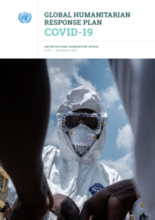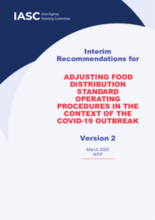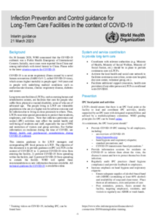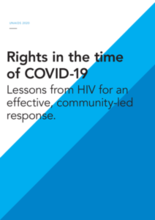This section includes resources on the response to the COVID-19 pandemic as it relates to child protection and children's care.
News on COVID-19 and Children's Care
Webinars and Events on COVID-19 Response
Displaying 551 - 560 of 756
This webinar explores guiding principles and practical tips for how your program can protect the children and families you serve during the COVID-19 pandemic.
This document from the United Nations Office for the Coordination of Humanitarian Affairs (OCHA) outlines the Global Humanitarian Response Plan for COVID-19, a joint effort by members of the Inter-Agency Standing Committee (IASC), including UN, other international organizations and NGOs with a humanitarian mandate, to analyse and respond to the direct public health and indirect immediate humanitarian consequences of the pandemic, particularly on people in countries already facing other crises.
This resource from the Consortium for Street Children aims to answer the questions of those who work with street-connected children in light of the COVID-19 crisis.
The Alliance for Child Protection in Humanitarian Action hosted a webinar on 24 March 2020 to introduce the new Technical Note: Protection of Children during the COVID-19 Pandemic.
On this webpage, CAFO has created a central place to collect information that might be helpful to members of the faith community as they advocate for children and families in their communities.
This document aims to guide the revision of existing Standard Operating Procedures (SOPs) for Food Distribution in the COVID-19 context at the country level to minimize the risk of exposure of personnel, partners and beneficiaries.
This guidance is to support the management of children and young people living in children's homes, residential special schools and colleges, and other residential facilities during the COVID-19 crisis.
This interim guidance is for Long-term care facility (LTCF) managers and corresponding infection prevention and control (IPC) focal persons in LTCF. The objective of this document is to provide guidance on IPC in LTCFs in the context of COVID-19 to 1) prevent COVID-19-virus from entering the facility, 2) prevent COVID-19 from spreading within the facility, and 3) prevent COVID-19 from spreading to outside the facility.
UNAIDS has consulted with the HIV and Human Rights Reference Group, experts from civil society, academia and public health and other United Nations agencies to identify key learnings from the HIV response that are critical in ensuring an evidence-informed and effective response to an epidemic.
This framework represents Save the Children’s planning assumptions and priority areas for implementation over four phases of programming: Preparedness, Initial Response, Large-Scare Response, and Recovery.





